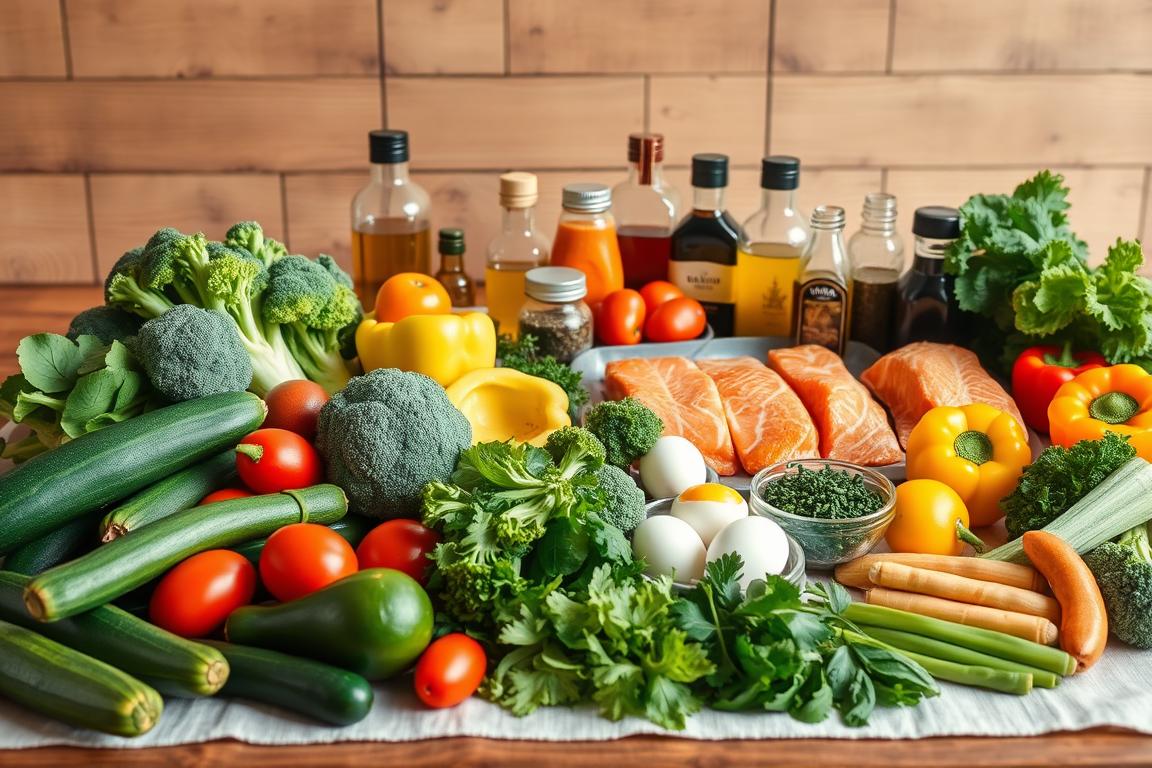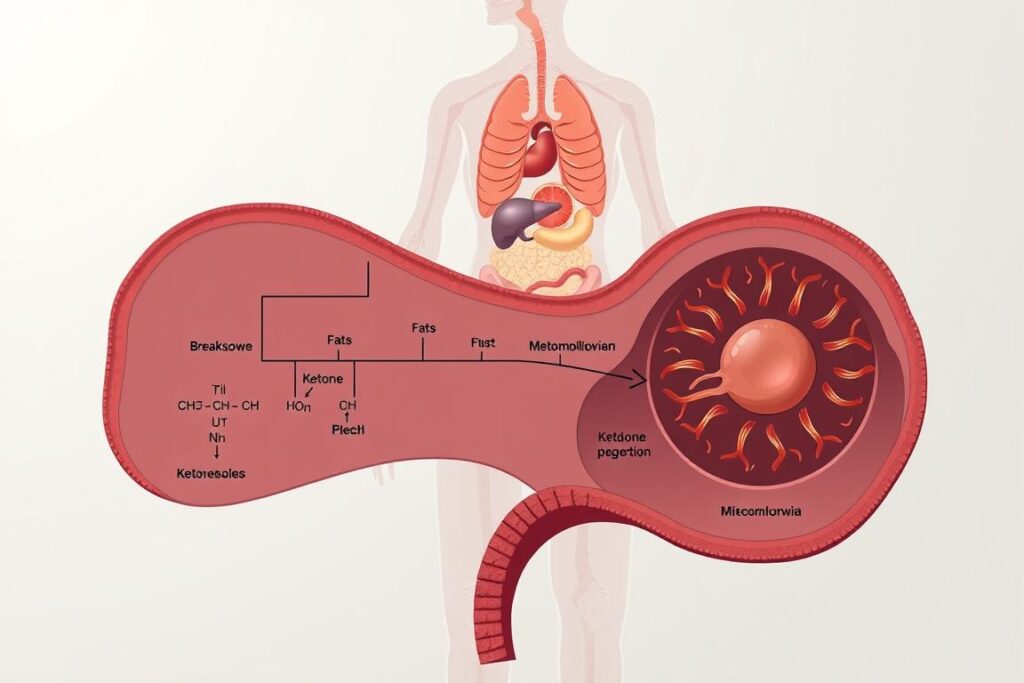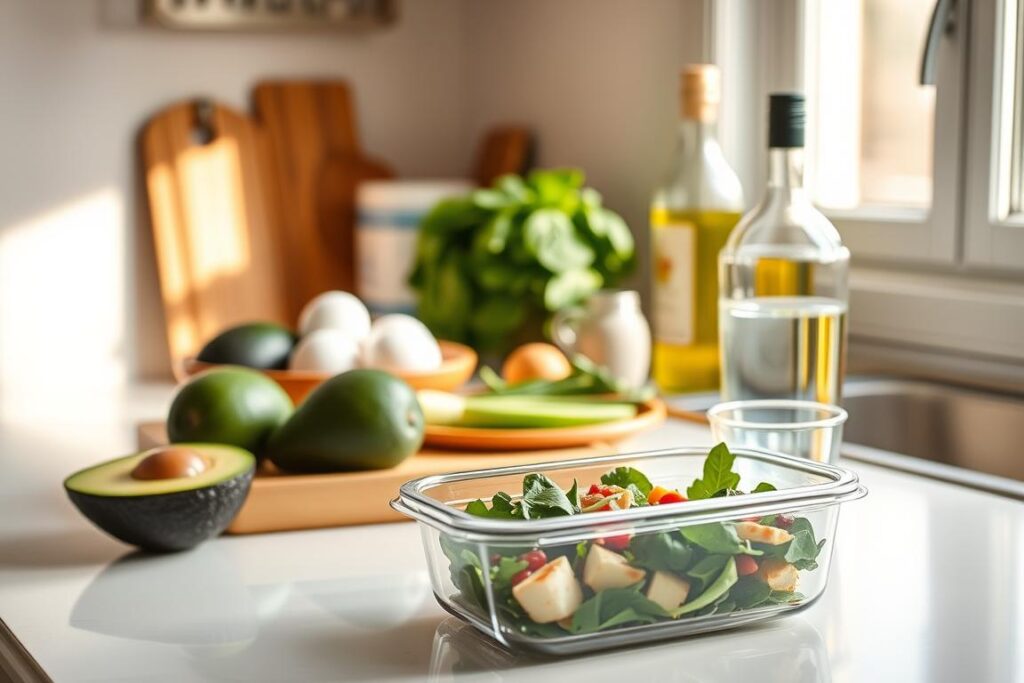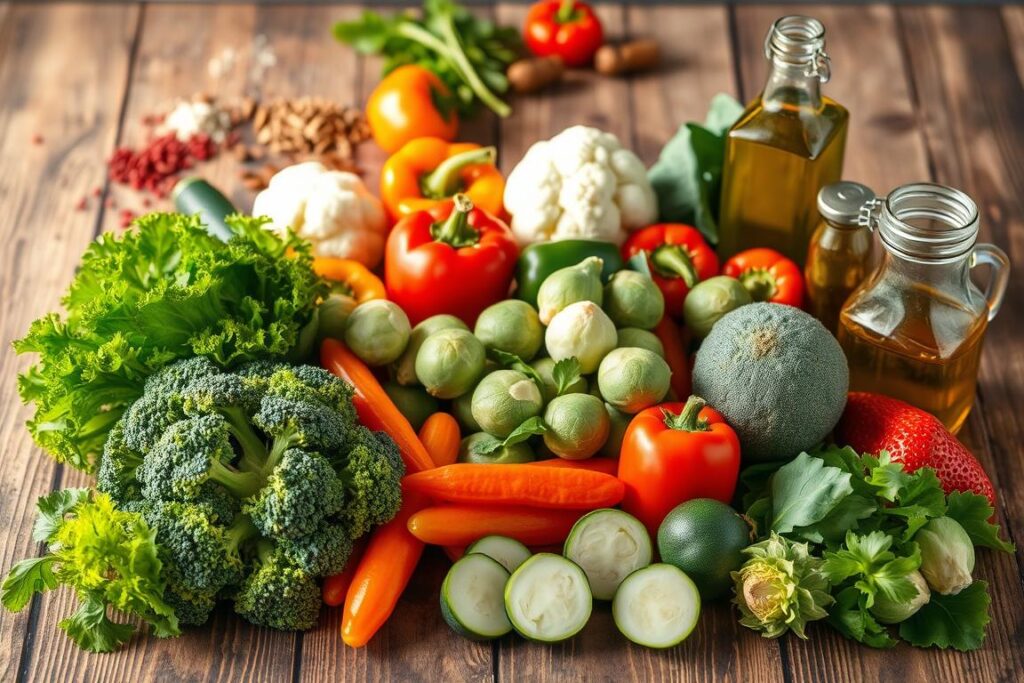Physical Address
304 North Cardinal St.
Dorchester Center, MA 02124
Physical Address
304 North Cardinal St.
Dorchester Center, MA 02124

Start your keto journey with our complete 7-Day Keto Meal Plan for Beginners. Get easy recipes, shopping lists, and expert tips to help you achieve ketosis safely and effectively.
Have you ever wondered why so many people swear by the transformative effects of a ketogenic lifestyle? The answer might be simpler than you think. When your body shifts from burning carbs to burning fat, remarkable changes can happen.
Welcome to your guide to starting the keto diet! If you’re feeling overwhelmed about where to begin, you’re in exactly the right place. This beginner-friendly approach will help you transition into ketosis safely and effectively.
The ketogenic approach is fundamentally a high-fat, low-carbohydrate eating pattern. Your daily food intake will shift to approximately 55-60% fats, 30-35% protein, and just 5-10% carbohydrates. This dramatic reduction in carbs helps your body enter a metabolic state called ketosis.
Throughout this guide, we’ll walk you through everything you need to know about the keto diet. We’ll provide a complete shopping list and outline seven days of delicious, easy-to-prepare meals. Whether your goal is weight loss, improved energy levels, or better overall health, this meal plan removes the guesswork. So, you can focus on enjoying the benefits.
The ketogenic diet is more than just a diet. It’s a way to change how your body uses energy. Knowing the science behind keto helps you make better food choices. This keeps you on track with your goals for more than just a week.
Ketosis is when your body uses fat for energy instead of carbs. Usually, carbs are your main energy source. But when you eat fewer than 50 grams of net carbs a day, your body looks for another fuel.
Your liver turns fat into ketone bodies when carbs are scarce. These ketones are a great fuel for your brain and muscles. This is why the ketogenic diet is good for losing weight.

It takes 2-7 days to get into ketosis. This depends on your metabolism, how active you are, and how low you keep carb intake. Many people feel more energetic, clear-minded, and less hungry once they adapt to using fat for energy.
To do well on the ketogenic diet, you need the right mix of macronutrients. Unlike diets that focus on low fat, keto has different ratios:
It might seem odd to eat so much fat, but it’s key for staying in ketosis. Healthy fats help your body make ketones and keep your energy up all day.
Protein is important, but not too much. Too little won’t help your muscles, and too much can turn to glucose, which can stop ketosis. Carbs should be watched closely, focusing on veggies and some fruits, but keeping net carbs low.
Knowing these basics helps you make good food choices as you start your 7-day keto journey.
Before starting your 7-day keto journey, getting ready is key. Switching to a diet low in carbs and high in fats needs some kitchen prep and food choices. Organizing your kitchen and knowing which foods fit your new diet will help you start smoothly.

Having the right tools makes cooking keto easier and faster. First, get a reliable food scale for accurate portion control. A good blender is essential for keto smoothies, sauces, and fat bombs. Also, a spiralizer and food processor are great for making zucchini pasta and cauliflower rice.Must-have keto kitchen tools:
For keto success, keep carbs under 50 grams a day. This means about 15 grams per meal. Knowing which foods help and which hinder ketosis is vital for beginners.Foods to Embrace:
Foods to Avoid:
Try to eat at least 5 servings of non-starchy veggies daily. A serving is ½ cup cooked or 1 cup raw. Aim for one veggie serving at most meals. This helps you get needed nutrients while keeping carbs low—a key part of starting keto.
A good keto shopping list is key to sticking to your low-carb diet. Having the right ingredients makes meal planning easier and keeps you away from high-carb foods. This guide will help you find your way through the grocery store and stock up for your keto journey.
Proteins and fats are the heart of a keto diet. Choose these foods to stay full and keep your body in ketosis:
Vegetables are packed with nutrients and low in carbs. Choose these for your meals:

These items add flavor and variety to your meals without breaking ketosis:
With this list, you’re ready to make tasty keto meals for your first week. Always check labels for hidden carbs and sugars that could ruin your low-carb diet.
The first 24 hours of your keto journey is key. You’ll eat low-carb meals that help your body start burning fat. These meals are full of healthy fats, moderate protein, and few carbs.
Everyone’s body reacts differently to new foods. Some people feel great right away, while others need a few days. Stay hydrated and listen to your body as you start this weight loss journey.
Start with a protein-packed breakfast that gives you energy. This meal has creamy avocado, crispy bacon, and eggs for a great start.
To make this easy recipe, cook 2-3 strips of bacon until crispy. Then, fry 2 eggs in the same pan. Slice half an avocado and place it on your plate with the eggs and bacon. Add salt, pepper, and red pepper flakes for extra flavor. This breakfast has about 25g of fat, 18g of protein, and 3g of net carbs.
By midday, you’ll want a refreshing meal. This salad has spinach, feta cheese, and grilled chicken for a keto-friendly lunch.
Mix 2 cups of fresh spinach with 1/4 cup crumbled feta cheese, 5-6 sliced olives, and cucumber. Add 4-5 ounces of grilled chicken breast seasoned with herbs. Use a dressing of 2 tablespoons olive oil, 1 tablespoon lemon juice, salt, and pepper. This lunch has about 30g of fat, 35g of protein, and 5g of net carbs.
End your first keto day with a healthy dinner. Salmon gives you omega-3s, and asparagus has fiber and vitamins with few carbs.
Season a 6-ounce salmon fillet with salt, pepper, and lemon zest. Bake at 375°F for 12-15 minutes. Toss 8-10 asparagus spears with olive oil, salt, and pepper. Roast alongside the salmon for the last 10 minutes. Serve with herb butter for extra fat.
This dinner has about 35g of fat, 34g of protein, and 4g of net carbs. It’s great for weight loss on keto.
Snacking helps manage hunger and keeps energy stable. For Day 1, try these keto-friendly snacks:
Your total daily intake for Day 1 is: 131g fat (70% of calories), 98g protein (25% of calories), and 16g net carbs (5% of calories). This ratio helps start ketosis and keeps you energized.
Welcome to Day 2 of your keto adventure. We’ll add more variety while keeping fat-burning macros in check. Your body is adjusting to fewer carbs and more healthy fats. Many feel more energetic as their metabolism shifts.
Today’s menu is simple yet flavorful. It’s designed to keep you motivated on your keto diet journey.
Start with a keto smoothie bowl that’s packed with nutrients. Blend unsweetened almond milk, almond butter, spinach, and keto-friendly protein powder.
Pour it into a bowl. Top with pumpkin seeds, coconut flakes, and fresh berries. This breakfast is full of healthy fats, protein, and natural sweetness.
For lunch, try tuna salad lettuce wraps. Mix tuna, mayonnaise, cucumber, avocado, and red onion.
Scoop it onto romaine or butter lettuce leaves. These wraps are full of protein and healthy fats. Add lemon juice and almonds for extra flavor and crunch.
Tonight, enjoy zucchini noodles with meatballs. Use a spiralizer or buy pre-spiralized noodles. Mix ground beef, onion, garlic, herbs, and an egg for the meatballs.
Brown the meatballs in olive oil. Serve with low-carb marinara sauce and Parmesan cheese. This dish is a keto-friendly twist on a classic.
Keep these snacks ready for Day 2:
Your Day 2 nutritional breakdown should be:
These easy recipes are quick to make and full of flavor. By Day 2, you’ll notice less hunger between meals as your body burns more fat.
Welcome to Day 3 of your keto meal plan. This is often when beginners face the “keto flu” symptoms. You might feel tired, irritable, or get headaches. But don’t worry, these symptoms are temporary and normal!
Today’s meals are designed to ease these effects and keep you on the ketogenic diet path.
Drinking plenty of water and keeping electrolyte levels balanced is key during this phase. Add a pinch of salt to your drinks to keep sodium levels up. The recipes below are chosen to comfort you while your body adapts.
Start with delicious cream cheese pancakes. They satisfy carb cravings and give you energy. Mix 2 oz cream cheese, 2 eggs, cinnamon, and vanilla extract until smooth. Cook in butter until golden on both sides.
These pancakes are low in carbs but high in fat. Top with berries and sugar-free syrup for a tasty, keto-friendly breakfast.
This comforting soup is easy on your stomach. Simmer cauliflower in chicken broth, then blend with heavy cream, salt, and pepper. Top with crispy bacon and olive oil.
The soup’s electrolytes fight keto flu symptoms. The bacon adds crunch and flavor, helping with sodium and potassium levels.
Tonight’s dinner is a flavorful keto meal. Sauté chicken in butter, then simmer in a sauce of heavy cream and spices. Serve over cauliflower rice.
This meal is rich in protein and fat, keeping you in ketosis. The spices add flavor and anti-inflammatory benefits.
Snacking helps keep your energy up and fights keto flu. Choose from nuts, cheese with bell pepper, or avocado with salt and lime. These snacks offer electrolytes and healthy fats.
Your Day 3 plan includes 75% fat, 20% protein, and 5% carbs. It’s around 1,500 calories. This ratio helps produce ketones and keeps you full. Use a food diary or app to track your intake.
Welcome to Day 4 of your keto journey. Many beginners feel their energy and focus improve as they start burning fat. Today, we focus on meals that help you lose weight and stay energized.
Begin with a keto breakfast casserole. Mix 6 eggs, 1 cup heavy cream, 2 cups shredded cheese, and low-carb veggies like spinach and mushrooms. Add bacon or sausage for extra taste and protein.
Pour the mix into a greased dish and bake at 350°F for 30-35 minutes. This breakfast has 25g fat, 20g protein, and 3g net carbs. It keeps you energized all morning.
For lunch, try a Greek salad with grilled steak. Mix cucumber, tomatoes, red onion, olives, and feta with olive oil, lemon juice, oregano, and salt.
Season a 4-6 oz steak with salt, pepper, and garlic before grilling. Slice it thin and add to your salad. This meal has 30g fat, 25g protein, and 6g net carbs. It’s great for keeping you in ketosis and helping with weight loss.
For dinner, enjoy stuffed bell peppers with ground turkey. Cut 2 bell peppers in half and remove seeds. Brown 8 oz ground turkey with olive oil, onion, garlic, and Italian seasoning.
Add 1/2 cup riced cauliflower and 1/2 cup shredded cheese. Fill the peppers with this mix, top with more cheese, and bake at 375°F for 25 minutes. Each serving has 28g fat, 22g protein, and 5g net carbs. It’s perfect for your keto meal planning.
As you get used to burning fat, you might feel less hungry. Enjoy a hard-boiled egg (0.6g carbs) and flax crackers with cheese (2g net carbs) for snacks. These snacks give quick energy without breaking ketosis.
Your Day 4 totals are about 1,650 calories. You get 75% from fat (138g), 20% from protein (83g), and 5% from carbs (21g net). This supports your body’s fat-burning and gives you all the nutrients for weight loss and energy.
By the fifth day on the ketogenic diet, you’re ready for new flavors. Your body is now a fat-burning machine. It’s important to keep your meals interesting to stay on track.
Try a keto version of waffles for breakfast. Coconut flour waffles are low in carbs but high in taste. Mix coconut flour, eggs, melted butter, and vanilla extract.
Cook the mix in a waffle iron until it’s golden. Add fresh blackberries and unsweetened whipped cream on top. This breakfast has 7g of net carbs, 22g of fat, and 12g of protein. It’s perfect for keeping you in ketosis.
For lunch, make chicken and avocado lettuce wraps. Use large lettuce leaves for wraps. Fill them with chicken, avocado, and pumpkin seeds.
Drizzle with olive oil, lemon juice, and herbs. These wraps are full of protein and healthy fats. They have only 3g of net carbs, making them a great low-carb meal.
Dinner is a colorful and tasty low-carb meal. Cook shrimp with garlic and ginger in coconut oil. Add broccoli and stir-fry until it’s tender-crisp.
Season with tamari sauce and red pepper flakes. This dinner has 4g of net carbs, 28g of protein, and 15g of fat. It’s a great mix of seafood and veggies that supports fat-burning.
Snack on keto-friendly foods like kale chips and cheddar cheese with bell pepper. Olives are also a great snack. They’re all low in carbs and high in flavor.
Your Day 5 diet has about 1,750 calories. It’s 75% fat, 20% protein, and 5% carbs. This mix keeps your body in fat-burning mode and makes your keto journey fun and sustainable.
Congratulations on making it to the end of your first week on the ketogenic diet! These last days help you solidify what you’ve learned and prepare for more success. Your body is now better at using fat for energy, and you might feel more energetic and clear-headed. Let’s wrap up your 7-day keto meal plan for beginners with tasty weekend meals that show this diet can be fulfilling and lasting.
Saturday offers a mix of taste and health to keep your keto journey going. Begin with a protein-rich breakfast that will energize you all morning.
Breakfast: Try scrambled eggs with jalapeños, green onions, and tomatoes, topped with sunflower seeds. This breakfast has about 5g of carbs and lots of healthy fats and protein to power your day.
Lunch: Make a refreshing tuna salad with cherry tomatoes and avocado, and add some macadamia nuts. This mix gives you omega-3s and monounsaturated fats, helping you stay in ketosis and feeling full.
Dinner: Enjoy juicy pork chops with herbs and your favorite non-starchy veggies like sautéed spinach or roasted Brussels sprouts. This dinner is comforting and keto-friendly, with about 30g of protein and few carbs.
Snacks: For between-meal hunger, try celery with almond butter or a small handful of mixed berries with nuts. These snacks are nutritious and keep your macros balanced.
End your week with Sunday’s meal plan to keep your keto journey going. These recipes are easy and satisfying, showing keto can be a part of your life.
Breakfast: Begin with creamy full-fat yogurt and keto-friendly granola made from nuts, seeds, and unsweetened coconut flakes. This breakfast has about 7g of net carbs and is full of probiotics and healthy fats for gut health and fullness.
Lunch: Treat yourself to a grass-fed beef burger (no bun) with guacamole and tomato, and a fresh kale salad with olive oil dressing. This lunch has about 35g of protein and lots of nutrients, with carbs under 10g.
Dinner: Make a flavorful stir-fry with chicken, broccoli, mushrooms, and bell peppers, seasoned with homemade satay sauce from peanut butter and coconut aminos. This dish shows global flavors can fit into your keto diet.
Snacks: Keep sugar-free turkey jerky for a protein boost, or a make-ahead egg and vegetable muffin for a quick snack. These snacks make sticking to keto easier, even on busy days.
As you finish this beginner’s guide to keto eating, take time to think about how far you’ve come. The skills and knowledge you’ve gained this week are a solid base for your keto journey. Remember, it’s consistency, not perfection, that leads to long-term success.
Reaching the end of your first week on the keto diet is a big deal. Your body is now getting used to using fat for energy instead of carbs. This change can make you feel less hungry during the day.
As you move forward, your energy levels should start to feel more stable. You might notice you’re thinking clearer and losing weight at a steady pace. Your blood sugar could also get better, which is great for people with diabetes.
To keep your diet interesting, try new things. Look for low-carb veggies, different proteins, and healthy fats you like. Many stores now have keto-friendly options, making it easier to stay on track.
Don’t just watch the scale. Take body measurements, track your energy, and see how your clothes fit. These signs of progress can be more motivating than just losing weight.
As you get more comfortable with keto, you might want to tweak your approach. You could adjust how much fat and protein you eat based on your goals or how active you are. Some people also find adding intermittent fasting helps them see better results.
If you’re using keto for health reasons, keep working with your doctor. With the foundation you’ve built, you’re ready to keep going and see the benefits of keto.